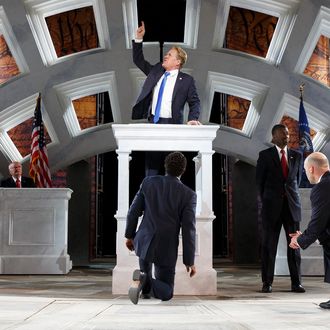
New York’s Public Theater has posted a statement thanking people for their support online after corporate donors Delta Air Lines and Bank of America pulled their support due to a controversial Trump-inspired production of Julius Caesar. “We are deeply grateful for the outpouring of support we have received around our free production of Julius Caesar,” the statement read. “We continue to be guided by our values of openness, inclusion, and the conviction that in drama and democracy alike, the clash of opposing values leads to truth. The Public Theater has always been — and will remain — of, by, and for the people.”
In a longer statement given to Vulture, the theater stood behind the production and emphasized its nonviolent message.
“The Public Theater stands completely behind our production of Julius Caesar. We understand and respect the right of our sponsors and supporters to allocate their funding in line with their own values. We recognize that our interpretation of the play has provoked heated discussion; audiences, sponsors and supporters have expressed varying viewpoints and opinions. Such discussion is exactly the goal of our civically-engaged theater; this discourse is the basis of a healthy democracy. Our production of Julius Caesar in no way advocates violence towards anyone. Shakespeare’s play, and our production, make the opposite point: those who attempt to defend democracy by undemocratic means pay a terrible price and destroy the very thing they are fighting to save. For over 400 years, Shakespeare’s play has told this story and we are proud to be telling it again in Central Park.”
The controversy began after critics on the right, including Breitbart, Fox News, and President Trump’s son Donald Trump Jr. took issue with the staging. In it, Gregg Henry plays a Trump-like Caesar, who, as Shakespeare’s writing dictates, is stabbed to death in the middle of the play, leading to the eventual downfall of Brutus and the other men who betrayed Caesar. “Julius Caesar can be read as a warning parable to those who try to figure for democracy by undemocratic means,” Oskar Eustic, who directed the production and is also the artistic director of the theater, said in a note published online. “To fight the tyrant does not mean imitating him.”
Nevertheless, critics have taken issue with the depiction of the death of the Trump-like Caesar, and compared it to Kathy Griffin’s recent photo shoot with Trump’s severed head, for which the comedian later apologized. In response, Delta claimed that the performance “crossed the line on the standards of good taste” and decided to end its sponsorship of the Public Theater. (The airline previously sponsored a theater that produced an interpretation of the play with an Obama-like figure in 2012.) Bank of America also withdrew its financial support from the production of Julius Caesar, but did not end its relationship with the theater. American Express distanced itself from the production, noting that its relationship with the Public does not include funding for Shakespeare in the Park, while the National Endowment for the Arts similarly issued a statement to make it clear that it did not sponsor this production of Julius Caesar. Those companies that have broken ties with the Public have received heavy criticism for doing so, especially from those in working in the arts.
This post has been updated throughout.





